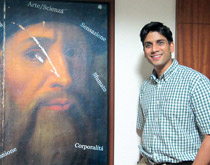
These days, it seems everyone is an author. More than 2 million books are reportedly published annually. Each author is a potential client for Bookbuzzr, a startup founded by Vikram Narayan (TPR’01). His company has devised technologies for authors to promote their books that goes beyond traditional advertising or Web sites. For example, authors can create a book excerpt though an embeddable widget that fans can share through social media. In less than 2 years, Bookbuzzr has more than 8,000 subscribers, including several authors of Amazon Kindle Store bestsellers. Narayan’s vision is for every book to be available in at least the free Bookbuzzr format. Other plans cost up to $20 monthly.
What was most challenging about starting a company from the ground up?
Very often, what you think the market wants and what it actually wants can be two different things. If you start work on an idea, you often get to a point where you have to make the call: kill it or keep going? You need to have confidence to kill a bad idea based on data and metrics.
Was there something specific about Bookbuzzr that kept you going?
Yes, it’s the goal most startups have—it’s not about just wanting to be the best; it’s about doing something completely different from what anyone else offers. The concept behind BookBuzzr was entirely new. Of course, you only have a brief time to refine the product before competitors emerge.
Why do you think a book-sampling widget is such effective marketing?
You can watch a YouTube video in two minutes, a movie in two hours. With a book, readers have to devote maybe 10-20 hours to it, so they need a sample to know it’s worth making that kind of time commitment. Also, the available market is smaller; not as many people read as often as they listen to music or play video games. The author’s challenge is always to reach more readers, which the BookBuzzr widgets can do virally.
What lesson from your time at Carnegie Mellon sticks out for you?
It wasn’t as much a lesson as it was the realization from the work I was doing with my classmates that I was happier working with a small group rather than a big structured environment. I decided in my second year that I wanted to be an entrepreneur. That’s why I haven’t even used venture capital funding. We don’t need the money now and, hopefully, never will.
—as told to Michelle Bova (DC’07)
Related Links:
Greenlighting Startups
CMU on Social



